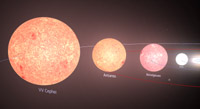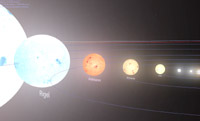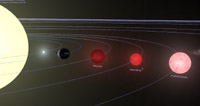Page 1 of 3
New comparison addon (work in progress)
Posted: 07.07.2007, 18:08
by Cham
I'm building a comparison between several famous stars. Here are some previews (click to enlarge) :

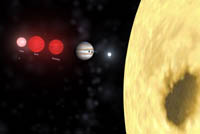
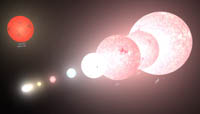
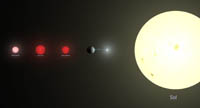
It's almost finished. I just need to tweak some details here and there. For the moment, there are some French floating labels. If there is some interest, I may publish an English version (or italian ? or even German ??). Of course, comments and suggestions are welcome.
The stars I'm comparing are these :
40 Eridani B (white dwarf)
Alula Australis (brown dwarf)
Gliese 229 B (red or brown dwarf ?)
Proxima Centauri (red dwarf)
Sol
Sirius A
Vega
Pollux
Arcturus
Aldebaran
Rigel
Deneb
Antares
Betelgeuse
VV Cephei
Old Sol (red giant phase)
Here are two sites which show about the same thing :
http://www.rense.com/general72/size.htm
http://www.youtube.com/watch?v=tL6E8mn-H2c
I'm also inspired by this web page :
http://www.solstation.com/stars/pc10bd.htm
Chris, if only there was a blurry atmosphere on the star surface !

Posted: 07.07.2007, 19:13
by Cham
NEW BUG !
Chris,
creating a 17th star with a simple planet in orbit around it is hard crashing Celestia. Adding the star without the planet doesn't crash Celestia. Of course, I checked the SSC definition and it's prefectly fine. It shouldn't be crashing Celestia.
Posted: 07.07.2007, 19:40
by Cham
Here's a link to the addon, which shows the bug (crashing Celestia) :
http://nho.ohn.free.fr/celestia/Cham/Di ... arison.zip (1.7 MB)
If you simply remove the definition of " " "Gliese 229 A (comparaison)" in the SSC file (NOT the STC file), it will work. But as soon as you add a planet to the star called "Gliese 229 A (comparaison)", Celestia will crash.
You can try changing the model used for that "planet", or even to remove it, or edit the parameters, it still crashing Celestia. I also tried the same SSC code for another star in the addon, and it works. It's crashing Celestia only if that object is associated to "Gliese 229 A (comparaison)".
Removing one of the other stars solve the problem for "Gliese 229 A (comparaison)". So apparently, there's a limit on the number of stars around a common barycenter ?
Posted: 07.07.2007, 22:36
by Johaen
Neat little comparison, Cham; very informative. I really like the glowy effect when all the stars start to merge together. That's kinda like how a single star should look, maybe.
Posted: 07.07.2007, 22:53
by ajtribick
I'd be wary of using Alula Australis Bb as a comparison object - we don't actually know what it is as it hasn't actually been observed.
We have a value for m*sin(i), which is in the brown dwarf range, but this does not give the correct total mass for the B subsystem, which suggests the object should be a K dwarf (which would then imply that the orbit is being observed almost face-on, which is statistically unlikely, but definitely not impossible), and I think I came across one of the papers on SIMBAD which suggests a brown dwarf is inconsistent with the spectrum of the system.
Posted: 07.07.2007, 22:57
by Cham
Then please give me an exampe of a well known brown dwarf of about the same spectral class and abs magn. I can change it easily. What I need is just a brown dwarf of about the same size as this one (a bit larger than Jupiter).
EDIT : And I must add that I'm using Celestia data here. Alula Australis Bb is already classified as a L brown dwarf in Celestia's database.
Posted: 07.07.2007, 23:36
by ajtribick
Ok, I'd suggest maybe 2M1207A (notable as host star to a planetary-mass object)... spectral type M8 (ok it is not actually L-type, but it is quite close), mass 20-30 Jupiter masses, radius about 0.25 solar radii (2.4 Jupiter radii), according to
this paper.
Posted: 08.07.2007, 01:03
by Cham
And what about Gliese 845 Ba ?
In Celestia's database, it's a T1V brown dwarf and has almost exactly the same radius as Alula Australis Bb. And it's nicely described there :
http://www.solstation.com/stars/eps-indi.htm
Posted: 08.07.2007, 10:04
by Vincent
Cham wrote:Here's a link to the addon, which shows the bug (crashing Celestia) :
http://nho.ohn.free.fr/celestia/Cham/Di ... arison.zip (1.7 MB)
If you simply remove the definition of " " "Gliese 229 A (comparaison)" in the SSC file (NOT the STC file), it will work. But as soon as you add a planet to the star called "Gliese 229 A (comparaison)", Celestia will crash.
Martin,
I can't reproduce this bug on my system. Everything works great, even with the label defined as a planet around 'Gliese 229 A (comparaison)'. I've tested your addon with all render paths (even OGL2) and both with 1.5pre3 and with the current CVS version.
Posted: 08.07.2007, 13:00
by selden
I have no problems on my Windows system, either. Someone with a Mac will have to try it.
Posted: 08.07.2007, 16:58
by Cham
Hmmmm, thanks guys.
On my Mac, the addon is crashing Celestia as soon as a 17th star has a planet, while all the others have a planet too. The bug is systematic and easy to reproduce.
Posted: 08.07.2007, 19:01
by Cham
I'm discovering that Celestia is VERY inaccurate about stars radius, in the case of "cool" objects. Currently, Celestia is giving some very wrong radius for cool dwarfs and giants. This is very sad, for a program which is supposed to be scientifically accurate.
The stars in my addon (data from Celestia only) for which there's a big discrepency with data found elsewhere on the net are these :
- Gliese 876 -- Celestia gives
0.28 Sol. I found on the net a mean value of
0.36 Sol.
- Proxima Cen (huge difference, by a factor of 2) -- Celestia :
0.08 Sol, while
0.15 Sol elsewhere.
- Aldebaran -- Celestia :
39.68 Sol, elsewhere :
25 Sol (approximate).
- Arcturus -- Celestia :
22.54 Sol, elsewhere :
15.9 Sol.
- Pollux (small difference) -- Celestia :
9.83 Sol, elsewhere :
8 Sol.
- Betelgeuse (huge difference) -- Celestia :
547.21 Sol, elsewhere :
630 Sol.
- Antares (huge and unacceptable difference) -- Celestia
493.56 Sol, elsewhere :
700 Sol.
- VV Cephei -- Celestia :
1219.43 Sol (I love the precision !

), elsewhere :
1600 - 1900 Sol.
Celestia is often giving some absurdly precise values in the upper-left corner, which frequently misleads my students (or any novice user, actually). In my view, this sullies the credibility of Celestia seriously.
Posted: 08.07.2007, 21:01
by ajtribick
As far as I understand it, the discrepancy arises because Celestia uses radius values calculated from magnitude and distance data. This requires bolometric magnitude, but Celestia only stores visual magntiudes, which means a correction relation is used - how accurate or generally applicable the bolometric correction values are, I don't know. Furthermore, it models stars as blackbodies, but for cool stars limb darkening and absorption become much more important, leading to large discrepancies.
Posted: 09.07.2007, 00:27
by dirkpitt
selden wrote:I have no problems on my Windows system, either. Someone with a Mac will have to try it.
I'm surprised that this isn't crashing on other systems - there IS a limit of 16 in render.h:
Code: Select all
static const unsigned int MaxSolarSystems = 16;and
Code: Select all
std::vector<LightSource> lightSourceLists[MaxSolarSystems];Note that this is a static array, so if more than 16 light source lists are present there is a buffer overrun and undefined behavior.
I'm not sure why there's a hard limit of 16, but at least Celestia shouldn't crash if it's exceeded.
Chris?
Posted: 09.07.2007, 23:43
by Cham
Posted: 10.07.2007, 05:26
by LordFerret
Not that I've viewed any of the code involved, but in seeing what Dirkpitt has informed, couldn't you just increase the value for "static const unsigned int MaxSolarSystems" and recompile? Could it be that easy?
Posted: 10.07.2007, 06:01
by chris
It is that easy . . . I never imagined that there would be more than 16 star systems with planets visible simultaneously, so I chose convenience and used a static array. I'll modify the code to make the list dynamic.
--Chris
Posted: 10.07.2007, 06:04
by Cham
Is making it dynamic have a frame rate cost ?
Posted: 10.07.2007, 06:23
by LordFerret
I can't imagine why it would, since all that's being done is moving the value's address space from the
const to
data area... or something along those lines? I'm thinking assembler when I probably shouldn't.

Posted: 11.07.2007, 21:28
by Cham
Can someone suggest a *well known* star which is *much* smaller than our Sun, excluding Proxima Cen ?









